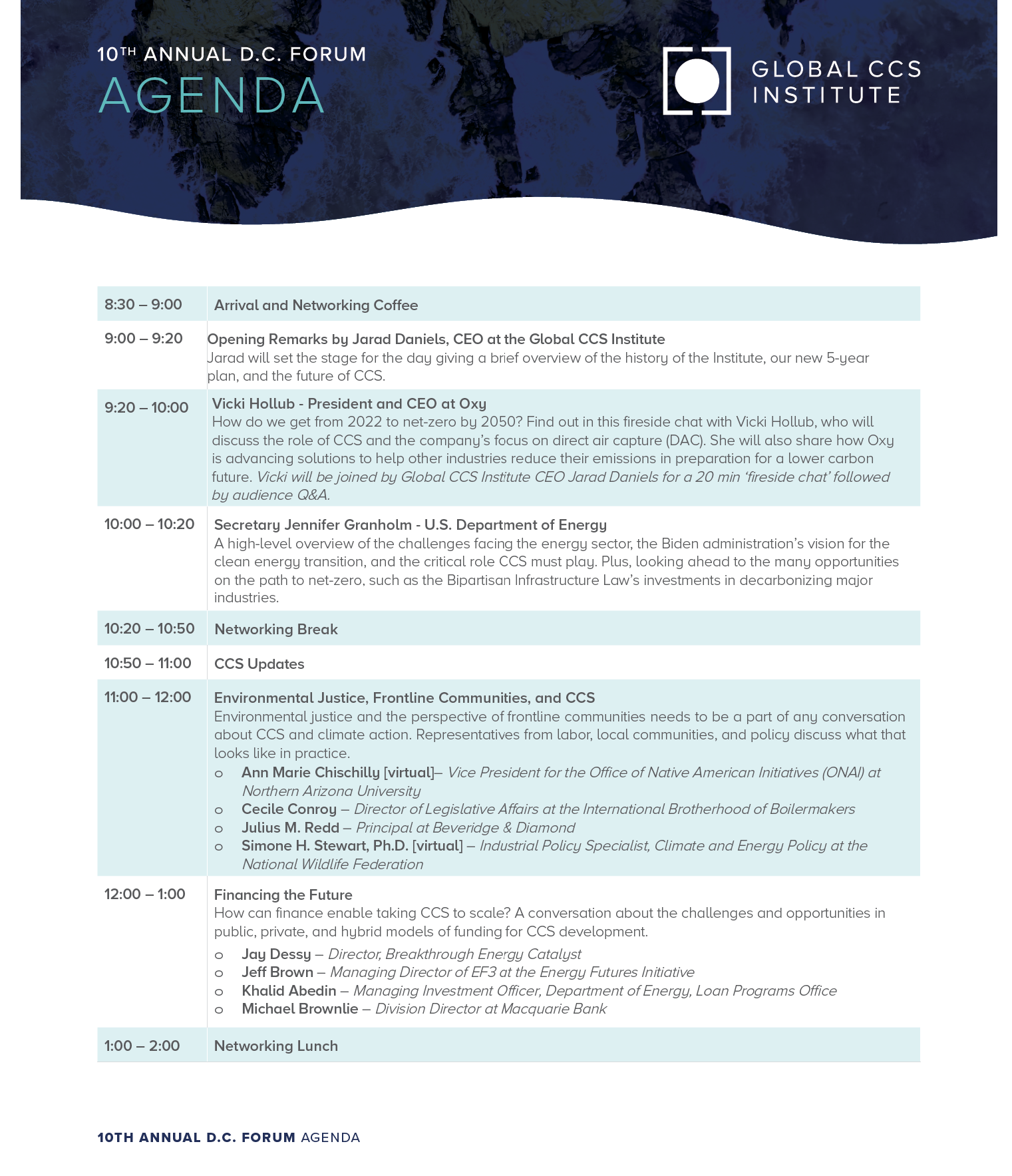The Global CCS Institute Holds the 10th Annual D.C. Forum
By Global Carbon Capture and Storage Institute (GCCSI)
16 June 2022
The Global CCS Institute’s 10th Annual D.C. Forum, hosted on 16 June, brought together the carbon capture and storage industry to address the rapidly evolving interplays of policy, finance, technology, and justice. The Institute’s CEO Jarad Daniels commenced the day-long conference by reminding the audience of the organisation’s vision, that CCS is an integral part of the net-zero emissions future, and its mission, to accelerate the global deployment of CCS. Jarad emphasised the Institute’s five-year plan with the objectives of fact-based influential advocacy, catalytic thought leadership, and authoritative knowledge sharing.
Occidental Petroleum CEO and President, Vicki Hollub took the stage soon after for a sit-down chat with Jarad to discuss how the hydrocarbon exploration and petrochemical manufacturing multi-national company is taking a proactive role in the energy transition. Vicki explained how current enhanced oil recovery practices can sequester carbon dioxide while generating the oil necessary to power the world economy. This process will be critical to producing net-neutral CO2 oil. She went on to highlight Oxy’s work in direct air capture technologies which will be necessary to draw down atmospheric carbon levels in the multifaceted approach to climate change mitigation.
Secretary of the United States Department of Energy, Jennifer Granholm, followed with a strong message of CCS leadership from the Biden administration. Secretary Granholm was clear that the United States cannot meet President Biden’s climate goals nor the global 1.5° C target in accordance with the Paris Agreement ‘without economy-wide deployment of carbon capture and carbon removal at scale.’ This is the most significant sign of support yet made by a U.S. Cabinet Member for carbon capture and storage technology and it signals CCS’s role as a key pillar in the United States’ climate strategy.
The day proceeded with panels addressing environmental justice, CCS financing, CCS technology, and carbon markets. The environmental justice panel remained memorable among the attendees. Panellists offered important insights, such as how stakeholder engagement is a critical component to the success of CCS projects, however, if done improperly, can create more controversy than buy-in. Companies are urged to come to identify trusted leaders in the community and approach these conversations with honesty, a sincere interest in learning and not solely educating, and an open mind. The audience was reminded that CCS development and deployment are inextricably linked to achieving environmental justice.
In the finance conversation, speakers explored how project risks are better understood than in the past, however, there is a lack of a durable economic business model that is restraining CCS deployment. Technological breakthroughs are only part of the equation as long-term policy and regulation are lacking in many places. Still, recent innovations all along the CCS value-chain excited attendees during presentations from the technology panel. Companies are leveraging developments in accelerated mineralisation, stacking high-efficiency capture modules, and site-specific assets to fit solutions across emitting industries.
The afternoon was punctuated with an energising address from Jonathan Pershing, Environment Program Director at the William and Flora Hewlett Foundation and former Special Envoy for Climate Change at the U.S. Department of State and former lead U.S. negotiator to the UNFCCC. Jonathon reminded attendees of the urgent nature of climate work and that robust partnerships in this arena are necessary to accelerate CCS deployment. He reminded the financiers and technology providers in the room that government and philanthropy can help set the stage for their work but they must drive the development of the infrastructure needed to create net-neutral and net-negative emissions.
Attendees were treated to a virtual ‘Around the World with GCCSI’ hosted by Institute staff signing in from Brussels, China, Abu Dhabi, and Australia. Each geography offered exciting news about recent projects and policy developments. The message from all was evident: CCS deployment is accelerating worldwide and stakeholders across emission sectors are welcoming the suite of carbon capture and storage technologies as viable solutions.
Brad Crabtree, Assistant Secretary for Fossil Energy and Carbon Management for the U.S. Department of Energy wrapped up the conference with comments on the government’s increasing role in investing in CCS up to the demonstration phase to absorb the upfront risk. Leaning into the carbon management piece of the department’s mandate, the assistant secretary offered assurance that the U.S. government has committed to being an industry-ally to CCS development and deployment and highlighted the billions of dollars apportioned to this end.
The Global CCS Institute’s 10th Annual D.C. Forum covered much ground. Still, attendees were left with the realistic message that there is much to be done yet in the CCS space towards achieving the world’s mid-century climate goals. The consensus was clear, though: industry, government, and the Global CCS Institute are ready to take on the challenge. Consistent with the organisation’s current five-year strategy, the Global CCS Institute will continue to partner with the Asia CCUS Network, providing knowledge and support to initiatives that accelerate CCS deployment throughout Asia.

